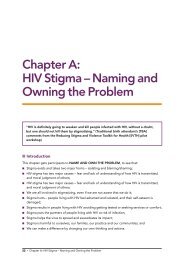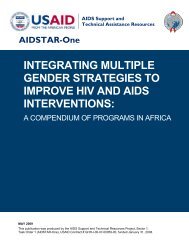Guide for Community Assessments on Women's Health Care - ICRW
Guide for Community Assessments on Women's Health Care - ICRW
Guide for Community Assessments on Women's Health Care - ICRW
You also want an ePaper? Increase the reach of your titles
YUMPU automatically turns print PDFs into web optimized ePapers that Google loves.
Put up the four topic cards al<strong>on</strong>g the wall – HEALTH SERVICES, COMMUNITY, HOUSEHOLD,<br />
WORKPLACE – and ask participants to identify barriers under each heading. Use small or buzz<br />
groups <str<strong>on</strong>g>for</str<strong>on</strong>g> this discussi<strong>on</strong>. If you are short <strong>on</strong> time, discuss this issue in plenary.<br />
<strong>Health</strong> Services <str<strong>on</strong>g>Community</str<strong>on</strong>g> Household Workplace<br />
●● L<strong>on</strong>g distances to<br />
health facilities and<br />
l<strong>on</strong>g waiting times.<br />
●● Insufficient levels of<br />
health care staff.<br />
●● Nurses too busy and<br />
lack skills to counsel<br />
HIV-positive women<br />
re: family planning.<br />
●● Stigma by health<br />
staff toward people<br />
living with HIV.<br />
●● Inc<strong>on</strong>sistent<br />
in<str<strong>on</strong>g>for</str<strong>on</strong>g>mati<strong>on</strong> <strong>on</strong><br />
breast-feeding <str<strong>on</strong>g>for</str<strong>on</strong>g><br />
HIV-positive women.<br />
●● Pap smears – no<br />
in<str<strong>on</strong>g>for</str<strong>on</strong>g>mati<strong>on</strong>, not<br />
easily available.<br />
●● Lack of treatment<br />
services <str<strong>on</strong>g>for</str<strong>on</strong>g> cancer.<br />
●● Lack of openness re:<br />
talking about sexual<br />
and reproductive<br />
health issues.<br />
●● Traditi<strong>on</strong>al healers<br />
d<strong>on</strong>’t have protective<br />
gloves and poorly<br />
briefed <strong>on</strong> HIV and<br />
AIDS.<br />
●● Erosi<strong>on</strong> of extended<br />
family & community<br />
spirit results in less<br />
voluntarism and<br />
mutual support<br />
●● Police overcharge<br />
rape victims <str<strong>on</strong>g>for</str<strong>on</strong>g><br />
<str<strong>on</strong>g>for</str<strong>on</strong>g>ms used as<br />
evidence in court.<br />
●● Poverty – people<br />
cannot af<str<strong>on</strong>g>for</str<strong>on</strong>g>d clinic<br />
fees & drugs.<br />
●● Women’s inequality:<br />
women depend<br />
<strong>on</strong> partners<br />
ec<strong>on</strong>omically and<br />
have little say over<br />
sex/use of c<strong>on</strong>doms<br />
or c<strong>on</strong>trol of<br />
resources.<br />
●● Women’s heavy<br />
workload stops them<br />
from going to the<br />
clinic.<br />
●● Violence stops<br />
women from<br />
reporting cases of<br />
abuse to the police.<br />
●● High cost of<br />
mosquito nets.<br />
●● Culture – women<br />
need permissi<strong>on</strong><br />
from mother-in-law<br />
to get treatment.<br />
●● Stigma and<br />
discriminati<strong>on</strong>.<br />
●● Lack of<br />
c<strong>on</strong>fidentiality.<br />
●● Taking time off work<br />
is unpaid (especially<br />
<str<strong>on</strong>g>for</str<strong>on</strong>g> women in the<br />
casual sector) or<br />
may result in loss of<br />
employment.<br />
●● Difficult to talk about<br />
health issues with<br />
employers without<br />
being victimized.<br />
Sessi<strong>on</strong> 6: Problem Analysis and Problem Solving<br />
Target Groups: ALL<br />
Facilitator’s Note: This is the final major step in the analysis process. During this step the group<br />
identifies the most important health problems (from those identified in Sessi<strong>on</strong>s 4 and 5) and works<br />
<strong>on</strong> soluti<strong>on</strong>s.<br />
Some groups may not have time <str<strong>on</strong>g>for</str<strong>on</strong>g> this step. If so, d<strong>on</strong>’t worry – it also is included in the workshop<br />
<strong>on</strong> Day Five.<br />
Things to Guard Against:<br />
It is important to get every<strong>on</strong>e to see this exercise as something real, and not just a wish list to be<br />
sent to government. The idea is to get participants to think of what they could do themselves as a<br />
community without a lot of outside support, and what things they would like to tell their MP. One<br />
way to organize soluti<strong>on</strong>s is into “no cost” and “low cost” categories.<br />
As part of introducing this step you should re-explain the objectives of the workshop and help people<br />
understand that we are not there to deliver a list of demands to the MP or any<strong>on</strong>e else. Talk about<br />
why it’s good that the priority issues will be taken up by MPs and what they will be likely to do with<br />
them – the next stage of the process, assuming that there will be a round table meeting or something<br />
to follow up with.<br />
46 Chapter C: Facilitating <str<strong>on</strong>g>Community</str<strong>on</strong>g> Assessment Workshops

















